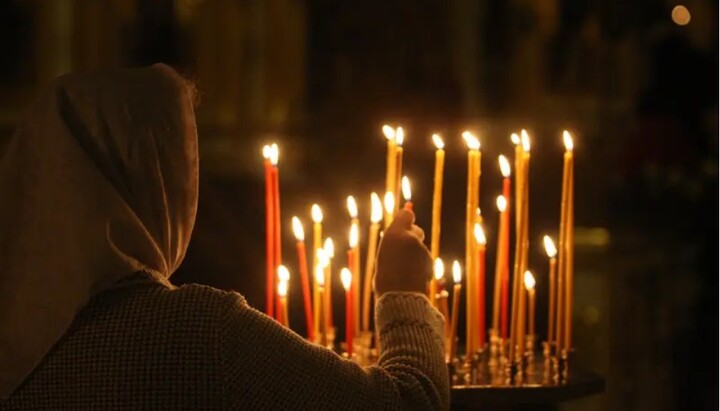I personally had to experience, through the example of our family, what it means to pray together for the deceased. After my grandmother passed away, she began to appear in the dreams of relatives in a very distressed state, asking for help and support. We organised ourselves and began to pray simultaneously for her repose every day for forty days, each in our own home.
Time passed, and she appeared in a dream to her daughter. When asked how things were, my grandmother replied, “At first, it was very bad, dark, cold, scary, and drowsily, but now it is very good.”
We are not ascetics, saints, or great men of prayer. We are ordibnary, sinful people, without any hint of anything special. And we prayed most simply, reading prayers from the prayer book, and I served the Litia – just as usual. But, as some would say today, “it works”. And all of us need to know this! God hears even us – common, sinful, imperfect people, very far from true holiness. And not only does He hear, but He also accepts our prayers, shows mercy and forgiveness. Of course, hundreds of such stories can be read today, but there is a difference between reading them and having one’s own experience.
I didn’t see one Bible verse to support this belief. Where does this idea come from?
Right, this is a controversial piece, and I never actually heard anyone in Orthodox Christianity outright say it. I actually heard the opposite, once, that people in hell could be prayed for and granted some relief through prayer but they remain in the torments of hell since this was how they had lived…
But consider that there was this split between Hades and Hell in some systems (though the language is not always the same), and Christ went down to preach to those in hell (1 Peter 3:19 - this is not the only interpretation, but a common one).
It may be the case that they are referring to someone who is not outright in hell, but someone who is in a state of limbo or who has not been resolved to heaven yet… At which point the author would still be mistaken in what they have put forward here, yes, I get that.
I am open to hearing any of your opinions on this as I am not fully committed to any position, and I am more curious about everyone’s feedback than asserting anything. But I do like to counter-argue if only to try to help crystalize some new position or at least be charitable to the initial proposition.
It’s a very touchy thing and I can understand the reason why people want to feel this way. But we just don’t have enough to go on from the Bible on the topic to make a conclusion one way or the other.
Though, I should say that I’m not Orthodox or Catholic, but Protestant, so the idea of purgatory doesn’t exist in my belief either, in that there’s nothing in scripture that indicates it exists, and that also comes from me being sola scriptura which is another Protestant position. Though I’m open to being wrong about that. I have heard about Abraham’s Bosom, but haven’t heard any reasons why it still exists after Jesus’ resurrection. And with verses like Luke 23:43, it makes me feel like the limbo state doesn’t exist in death.
Sorry if I came off confrontational in my first reply.
There is an interesting passage in Maccabees that implies that Jews previously believed that there could be a process for atoning for the sins of the dead:
In II Maccabees 12:39-46, we discover Judas Maccabeus and members of his Jewish military forces collecting the bodies of some fallen comrades who had been killed in battle. When they discovered these men were carrying “sacred tokens of the idols of Jamnia, which the law forbids the Jews to wear” (vs. 40), Judas and his companions discerned they had died as a punishment for sin. Therefore, Judas and his men “turned to prayer beseeching that the sin which had been committed might be wholly blotted out… He also took up a collection… and sent it to Jerusalem to provide for a sin offering. In doing this he acted very well and honorably… Therefore he made atonement for the dead, that they might be delivered from their sin.”
There is also this passage in Matthew 5:24-25:
Make friends quickly with your accuser, while you are going with him to court, lest your accuser hand you over to the judge, and the judge to the guard, and you be put in prison; truly I say to you, you will never get out till you have paid the last penny (Matthew 5:25-26).
I think these hint at a period before heaven in which some form of atonement is possible, though I am not sure to what extent it fits the Catholic concept of purgatory as such.
my understanding:
The Catholic belief is when a person dies, they are judged either to heaven or hell.
Purgatory is for those on the way to heaven who die with some accrued debt from sin, for example: you steal a car and are sorry for having done so, so are forgiven, but you are still legally required to pay the car amount back, but say you die before doing so. The ultimate “debt” of having stolen the car, the infinite debt of sin, you confessed to, and Jesus paid that debt, so you were forgiven. But still you had done wrong. This “wrong” was usually to be made up with penances in life (where the indulgences controversy came in). I think this is a sound enough explanation but you could search out others. If you had paid the car off so to speak, and were sorry for the sin of theft, you would be in a position to go straight to heaven.
I have read orthodox have some idea of “toll houses”, which is not like the Catholic conception of purgatory at all, and which I am not entirely acquainted with.
The Catholic idea of limbo is basically a place in hell, but not one of active suffering, for those who die unbaptized but otherwise lived “good enough” of a life (naturally virtuous ignorant pagans, or unbaptized infants, for examples). This speculative state arose because all who enter heaven must be baptized, but these such people are not baptized, but they have also not chosen to be evil with their will (in the case of infants certainly, but even with "virtuous ignorant non-Christians). In the case of infants, it is also hard to apply the idea of a “baptism of desire”, or that such infants would have desired baptism if they had the opportunity to obtain it, and even is difficult in the case of those who are unaware of the need for baptism, like an otherwise virtuous ignorant non-Christian.
Souls may be prayed “out of purgatory”, and purgatory is a place of suffering “purification”, like hell is a place of suffering. So, as people metaphorically say they are “going through hell”, I could see a Catholic possibly expressing praying a soul out of Purgatory as “praying them out of hell”, but they wouldn’t mean this literally, and I would wonder if some theological cross-confusion might have resulted from speaking in this way.
An exception (skimming the article) might be some mirculous-like stories where people have died temporarily and come back from hell to tell the tale, or had a near-death vision of hell. This is the only instance I can think of from a Catholic view where a person might “go to hell” and come back, possibly due to the prayers of others.


